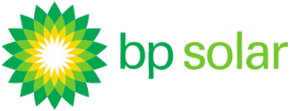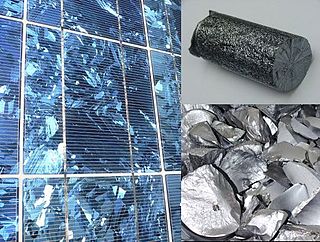
Photovoltaics (PV) is the conversion of light into electricity using semiconducting materials that exhibit the photovoltaic effect, a phenomenon studied in physics, photochemistry, and electrochemistry. The photovoltaic effect is commercially used for electricity generation and as photosensors.

A solar panel is a device that converts sunlight into electricity by using photovoltaic (PV) cells. PV cells are made of materials that produce excited electrons when exposed to light. The electrons flow through a circuit and produce direct current (DC) electricity, which can be used to power various devices or be stored in batteries. Solar panels are also known as solar cell panels, solar electric panels, or PV modules.

SolarWorld is a German company dedicated to the manufacture and marketing photovoltaic products worldwide by integrating all components of the solar value chain, from feedstock (polysilicon) to module production, from trade with solar panels to the promotion and construction of turn-key solar power systems. The group controls the development of solar power technologies at all levels in-house.
Nanosolar was a developer of solar power technology. Based in San Jose, CA, Nanosolar developed and briefly commercialized a low-cost printable solar cell manufacturing process. The company started selling thin-film CIGS panels mid-December 2007, and planned to sell them at 99 cents per watt, much below the market at the time. However, prices for solar panels made of crystalline silicon declined significantly during the following years, reducing most of Nanosolar's cost advantage. By February 2013 Nanosolar had laid off 75% of its work force. Nanosolar began auctioning off its equipment in August 2013. Co-Founder of Nanosolar Martin Roscheisen stated on his personal blog that nanosolar "ultimately failed commercially." and that he would not enter this industry again because of slow-development cycle, complex production problems and the impact of cheap Chinese solar power production. Nanosolar ultimately produced less than 50 MW of solar power capacity despite having raised more than $400 million in investment.

BP Solar was a manufacturer and installer of photovoltaic solar cells headquartered in Madrid, Spain, with production facilities in Frederick, MD, India and the People's Republic of China. It was a subsidiary of BP.

Spain is one of the first countries to deploy large-scale solar photovoltaics, and is the world leader in concentrated solar power (CSP) production.

First Solar, Inc. is an American manufacturer of solar panels, and a provider of utility-scale PV power plants and supporting services that include finance, construction, maintenance and end-of-life panel recycling. First Solar uses rigid thin-film modules for its solar panels, and produces CdTe panels using cadmium telluride (CdTe) as a semiconductor. The company was founded in 1990 by inventor Harold McMaster as Solar Cells, Inc. and the Florida Corporation in 1993 with JD Polk. In 1999 it was purchased by True North Partners, LLC, who rebranded it as First Solar, Inc.
For solar power, South Asia has the ideal combination of both high solar insolation and a high density of potential customers.
Sharp Solar, a subsidiary of Sharp Electronics, is a solar energy products company owned by Sharp Corporation and based in Osaka, Japan.

Solar power has a small role in electricity production in the United Kingdom.

China is the largest market in the world for both photovoltaics and solar thermal energy. China's photovoltaic industry began by making panels for satellites, and transitioned to the manufacture of domestic panels in the late 1990s. After substantial government incentives were introduced in 2011, China's solar power market grew dramatically: the country became the world's leading installer of photovoltaics in 2013. China surpassed Germany as the world's largest producer of photovoltaic energy in 2015, and became the first country to have over 100 GW of total installed photovoltaic capacity in 2017.

Yingli, formally Yingli Green Energy Holding Company Limited -. Yingli Green Energy Holding Company Limited, known as "Yingli Solar," is a solar panel manufacturer. Yingli Green Energy's manufacturing covers the photovoltaic value chain from ingot casting and wafering through solar cell production and solar panel assembly. Yingli's photovoltaic module capacity is 30 GWs.
SunEdison, Inc. is a renewable energy company headquartered in the U.S. In addition to developing, building, owning, and operating solar power plants and wind energy plants, it also manufactures high purity polysilicon, monocrystalline silicon ingots, silicon wafers, solar modules, solar energy systems, and solar module racking systems. Originally a silicon-wafer manufacturer established in 1959 as the Monsanto Electronic Materials Company, the company was sold by Monsanto in 1989.

Between 1992 and 2023, the worldwide usage of photovoltaics (PV) increased exponentially. During this period, it evolved from a niche market of small-scale applications to a mainstream electricity source. From 2016-2022 it has seen an annual capacity and production growth rate of around 26%- doubling approximately every three years.

Polycrystalline silicon, or multicrystalline silicon, also called polysilicon, poly-Si, or mc-Si, is a high purity, polycrystalline form of silicon, used as a raw material by the solar photovoltaic and electronics industry.

Activ Solar GmbH, headquartered in Vienna, Austria, was a developer of solar energy. It was engaged in the production of polycrystalline silicon (polysilicon) for the solar PV industry and the development of large-scale photovoltaic power stations in Ukraine. In February 2016, it filed for insolvency.
Xi'an LONGi Silicon Materials Corporation is a Chinese silicon producer. LONGi was established in 2000 and is the world's largest monocrystalline silicon producer. Baoshen Zhong is LONGi's chairman.
The Silicon Module Super League (SMSL) later the Solar Module Super League is a group of major crystalline silicon (c-Si) module suppliers in the solar PV industry. The 'big six' industry group members were Canadian Solar, Hanwha Q CELLS, JA Solar, Jinko Solar, and Trina Solar. LONGi the world's largest solar monocrystalline silicon manufacturer and GCL, the world's largest solar poly crystalline silicon manufacturer, both joined the SMSL in mid-2016. As of February 2019, PVTech added First Solar and Risen Energy to the list of SMSL manufacturers.

LONGi Green Energy Technology Co. Ltd. or LONGi Group (隆基股份), formerly Xi'an Longi Silicon Materials Corporation, is a Chinese photovoltaics company, a major manufacturer of solar modules and a developer of solar power projects.









